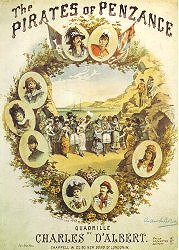You are here: > > Introduction
![]()
Adapted from the book "Tit-Willow or Notes and Jottings on Gilbert and Sullivan Operas" by Guy H. and Claude A. Walmisley (Privately Printed, Undated)
THE PIRATES OF PENZANCE, or The Slave of Duty, was first produced at the Fifth Avenue Theatre in New York on 31 December, 1879, and, also, for copyright purposes one performance was given in England on the previous day at the Royal Bijou Theatre, Paignton. The first performance in London, however, was not until 3 April, 1880, when it was produced at the Opera Comique.
In the story Frederic, the hero of the piece, was as a child apprenticed to a pirate by his nurse who, being rather hard of hearing, had mistaken her master's instructions to apprentice the boy to a pilot. The idea probably originated from the fact that Gilbert himself had been captured by a gang of Italian brigands at the early age of two, and had been ransomed for £25.
Act I opens with a rocky sea-shore scene on the coast of Cornwall and shows a number of pirates drinking and playing cards. They toast young Frederic, the Pirate Apprentice, who being over twenty one, "rises from indenture freed" and is "a pirate now indeed!"
However Ruth, his former nursemaid, and now a piratical maid-of-all-work, explains to the pirates her unfortunate mistake in apprenticing the boy to their own Pirate King.
Frederic tells them that he likes them as individuals but nevertheless, now that he is out of his indentures, he intends to exterminate them, purely out of a sense of duty, but he points out that such a procedure would be unnecessary if they would give up piracy as, in any case, they will never make it pay owing to their being too tender-hearted. As orphans themselves they never molest an orphan; a fact well known to others who always claim to be orphans when captured, and so are allowed to go free. Ruth implores Frederic to take her with him, but as he has never seen another woman since he was eight years old he cannot tell how she compares with them and, unfortunately for Ruth, a bevy of beautiful maidens, daughters of Major General Stanley who has bought a near-by estate, come clambering over the rocks and into the pirates lair.
Frederic then realizes that Ruth, by comparison, is plain and old, although she is only forty-seven. She goes off, and he speaks to the girls who are about to go paddling until their father and the picnic hampers arrive. He implores one of them to marry him, but they refuse, all save one, Mabel, who hearing his plea as she enters readily agrees to do so and sings her beautiful waltz song, "Poor wand'ring one!", which necessitates brilliant technique, and is invariably greeted with tremendous applause. They go off together.
Soon the pirates return and seize the girls, delighted at the prospect of getting married with impunity; but their joy is short-lived as the Major-General, resplendent in scarlet and gold. a somewhat unusual garb for a picnic by the sea, suddenly appears and sings his famous patter song, which must be quite the most difficult to sing of any such song that Gilbert wrote, and all honour is due to the singer in "putting it across" with such well-clipped and military precision.
The song is taken at a tremendous pace, but despite the many astounding tongue-twisters-such as: "I quote, in Elegiacs, all the crimes of Heliogabalus! In conics I can floor peculiarities parabolus . . ."-and there are four verses-the singer, without any hesitation whatsoever, invariably clears all his fences in magnificent style and pulls up at the end, somewhat breathless, perhaps, but obviously a winner. Truly a better Major-General has never sat a gee.
In order to dissuade the pirates from marrying his daughters and leaving him to go through the remainder of his life unfriended, unprotected and alone he appeals to their sense of fair play by explaining that he, too, is an orphan, and it is then that he and the Pirate King have their rather laboured joke about "orphan" and "often"; it is certainly a long drawn-out affair and one can easily foresee the whole development of the episode, but then Gilbert possessed a truly democratic and philanthropic mind and he always remembered the weaker intellects in the audience and preferred, for their sakes, to hammer out a joke rather than risk the chance of their failing to appreciate it.
The Act ends with Ruth imploring Frederic not to leave her, but he scorns her and casts her from him.
Act II shows a ruined chapel by moonlight, with General Stanley seated there surrounded by his daughters. He points out that, having falsely described himself as an orphan to escape the pirates' clutches, he comes to the chapel, night after night, to humble himself before the tombs of his ancestors by purchase.
In this opera Gilbert satirizes snobbery as displayed by Major-General Stanley, who, having bought a large estate, claims the long-dead members of the family as his own ancestors.
Meantime Frederic has arranged for the local police to march with him against the pirates—an expedition that appears to fill them with dread; however after a great deal of delay they eventually go.
Frederic is about to follow them when the Pirate King and Ruth appear at the window, armed, and cover him with their pistols. But they soon put away their firearms and tell him, in a most friendly manner, of a startling paradox. They remind him that he was born in leap year—on 29 February—which occurs every fourth year, and therefore reckoning his age by birthdays he is "a little boy of five", despite the fact that he has actually lived for twenty-one years.
Frederic is therefore a pirate still and owing to his sense of duty he feels compelled to tell the Pirate King and Ruth that General Stanley is not, and never was, an orphan. The Pirate King is furious at the deception played on him and storms off to collect his men with a view to attacking Tremorden Castle that very night.
The police reappear and Mabel explains to them that as Frederic has rejoined the pirates he cannot now lead the attack on their lair. The police, who have a great deal of fun poked at them in this scene, are much perturbed at the thought of having no leader and the Sergeant then sings his amusing song—"When constabulary duty's to be done, the policeman's lot is not a happy one".
With reference to this song it is interesting to note that when Sullivan was quite young, about 20, he became organist at St. Michaels' Chester Square, and having practically no tenors or basses he augmented his choir with a dozen or so policemen from the station near the church. "I used to think of them sometimes," he wrote, "when I was composing the music for The Pirates of Penzance."
As the pirates approach, the police discreetly hide but the Major-General appears, in dressing-gown and carrying a candle; however, despite the boisterous singing of the pirates the General decides that he was wrong when he thought he heard a noise and assumes that it was only "the sighing of the breeze".
Sullivan's beautiful accompaniment to this song, "Softly sighing to the river, comes the lonely breeze" is a masterpiece of descriptive music, and the violins in very truth are "setting nature all a-quiver, rustling thro' the trees".
Suddenly the pirates appear and seize the General; but he calls upon the police who bravely spring up from their concealment, and a short fight takes place in which they are vanquished. However the Sergeant calls upon the victorious pirates to "Yield, in Queen Victoria's name!" They obligingly do so and kneel at the feet of the police. At this critical moment Ruth, in true Gilbertian manner, announces that the pirates in reality "are all noblemen, who have gone wrong!" The General thereupon gives his daughters to the newly discovered peers, and all ends happily.
Both Gilbert and Sullivan incorporated a small amount of words and music in this opera from their first joint production of 1871, Thespis, or The Gods Grown Old. The music of Thespis, however, was never published. When Sullivan started to compose the music for The Pirates he commenced in the middle of Act II, but had not proceeded far before he was compelled to leave for America with Gilbert to stop the pirating of H.M.S. Pinafore; therefore, with the exception of that portion which he had composed in England Sullivan wrote the whole of the score of The Pirates of Penzance at his hotel in New York.
"I think it will be a great success", he wrote home to his Mother, "for it is exquisitely funny, and the music is strikingly tuneful and catching." The following is an extract from another of Sullivan's letters in which he gives his impressions of The Pirates. "The libretto", he says, "is ingenious, clever, wonderfully funny in parts, and sometimes brilliant in dialogue, beautifully written for music, as is all Gilbert does, and all the action and business perfect. The music is infinitely superior in every way to Pinafore — 'tunier' and more developed, of a higher class altogether. I think in time it will be more popular".
The music of the opera is as Sullivan described it, "strikingly tuneful and catching." On its first production in London the opera ran for over 400 performances. (sic)
|
Page Created 20 August, 2011


